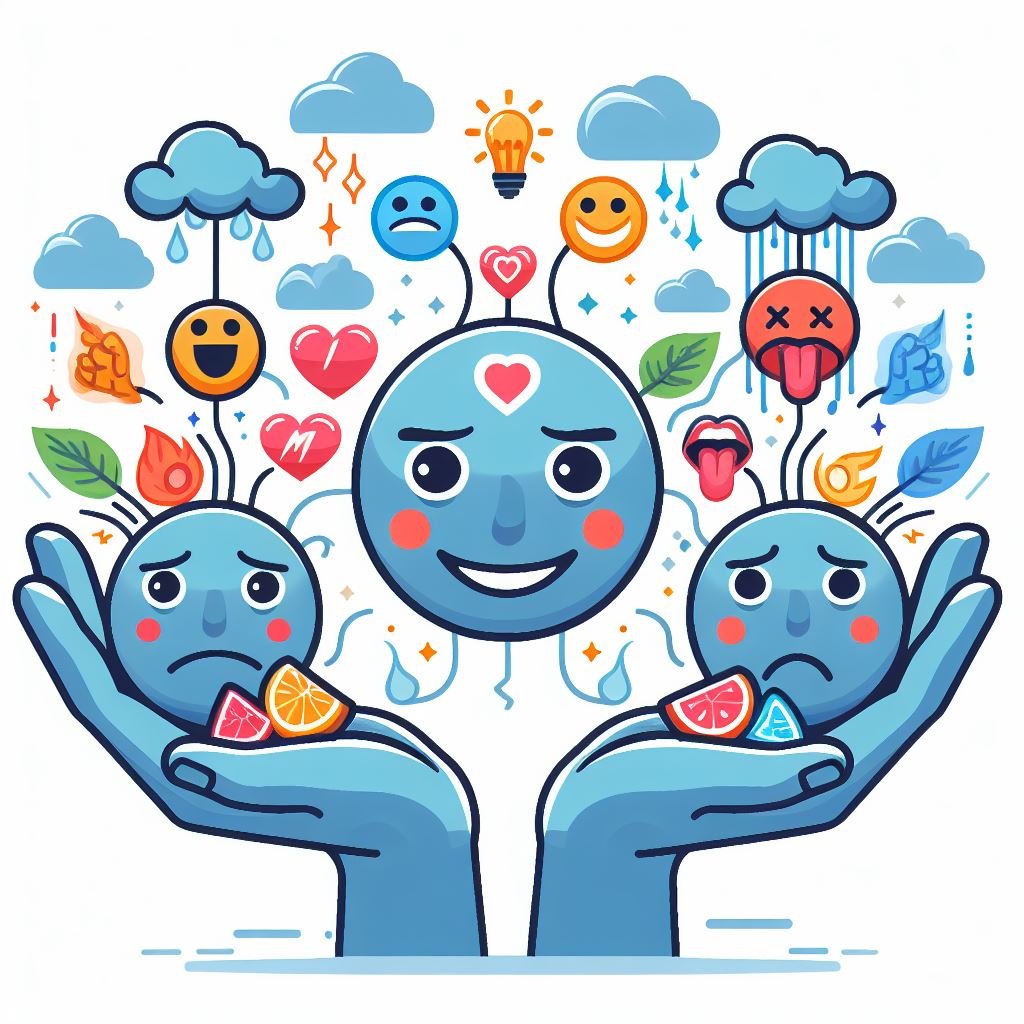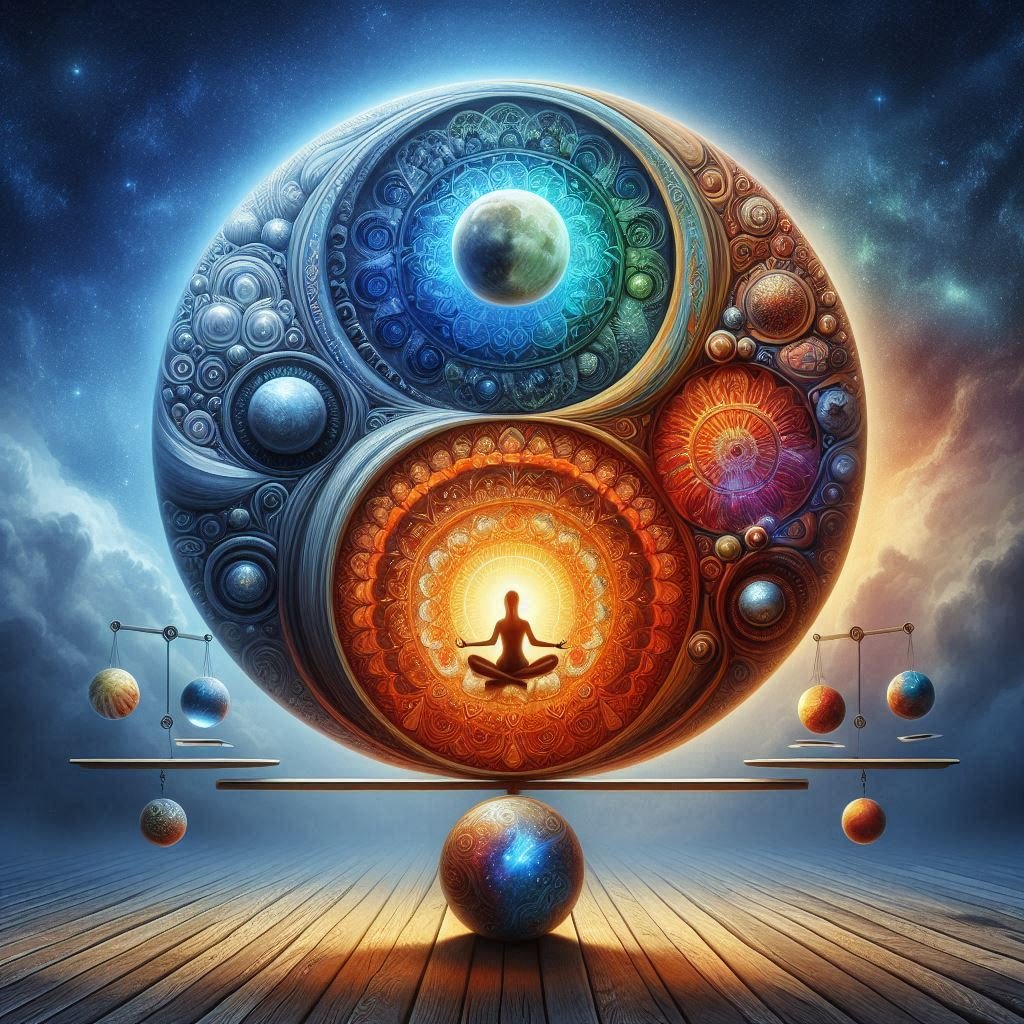Emotional balance, a term you might have heard often but what does it really mean? Let’s dive into it.
Imagine you’re on a boat. The waves are the emotions that come and go. Sometimes they’re calm, and sometimes they’re stormy. But no matter how big the waves get, your boat stays afloat. That’s emotional balance. It’s not about avoiding the waves, but learning how to ride them.

Emotional balance is a crucial aspect of our well-being and mental health. It’s the state where we are in control of our emotions rather than them controlling us. It’s about experiencing our emotions without being overwhelmed by them. It’s about expressing our emotions in a way that’s appropriate for the situation.
Now, you might be wondering, why is emotional balance so important? Well, our emotions influence every aspect of our lives – how we think, how we act, and even how we interact with others. When we’re emotionally balanced, we’re better equipped to handle life’s ups and downs. We’re more resilient and adaptable.
But achieving emotional balance isn’t always easy. It requires self-awareness, self-care, and practice. It involves recognizing our emotions, understanding what triggers them, and developing healthy coping strategies. It’s a journey, not a destination.
In the following sections, we’ll explore the importance of emotional balance, the role of emotions, and how to achieve emotional balance. We’ll also discuss emotional intelligence, mindfulness, and the impact of emotional balance on relationships and mental health. So, let’s embark on this journey together, towards achieving emotional balance.
Remember, emotional balance isn’t about being happy all the time. It’s about feeling the full range of human emotions and managing them effectively. It’s about living a balanced and fulfilling life. So, are you ready to find your balance?
The Importance of Emotional Balance: Why Emotional Balance Matters
Emotional balance is more than just a buzzword. It’s a fundamental aspect of our overall well-being. But why is it so important? Let’s delve into it.

Firstly, emotional balance allows us to experience life more fully. It doesn’t mean we don’t feel negative emotions. Instead, it means we’re not overwhelmed by them. We can experience joy, sadness, anger, fear, and more, without these emotions taking over our lives.
Secondly, emotional balance contributes to our mental health. When we’re emotionally balanced, we’re less likely to suffer from mental health issues like anxiety and depression. We’re more resilient and better equipped to handle stress and adversity.
Thirdly, emotional balance enhances our relationships. It helps us communicate more effectively, manage conflicts better, and build deeper connections with others. It allows us to be more empathetic and understanding, which are key to healthy relationships.
Lastly, emotional balance boosts our performance and productivity. When we’re in control of our emotions, we can focus better, make better decisions, and be more creative. It’s no wonder that emotional balance is often linked to success in various areas of life.
However, achieving emotional balance isn’t a one-time task. It’s a continuous process that requires effort and practice. But the good news is, it’s a skill that can be learned and improved over time. In the following sections, we’ll explore how to achieve emotional balance and maintain it.
Remember, emotional balance is not about suppressing or ignoring our emotions. It’s about understanding them, accepting them, and managing them effectively. It’s about living a balanced and fulfilling life. So, let’s continue our journey towards achieving emotional balance.
The Role of Emotions: Positive and Negative Emotions
Emotions are an integral part of our lives. They are like the colors on a palette, each one adding a unique shade to our experiences. But what role do they play? Let’s find out.

Emotions serve several purposes. They are our internal compass, guiding us through life. They help us respond to our environment. For instance, fear can alert us to danger, while joy can draw us towards something beneficial.
Both positive and negative emotions have their roles. Positive emotions, like happiness and love, can motivate us and make life enjoyable. They can strengthen our relationships and even boost our health.
On the other hand, negative emotions, like sadness and anger, while uncomfortable, are not necessarily bad. They can signal that something is wrong and needs to change. They can prompt us to take action and solve problems.
However, when negative emotions become overwhelming or persistent, they can lead to emotional imbalance. This is where emotional balance comes into play. It’s about experiencing our emotions, but not being swept away by them. It’s about expressing our emotions in a healthy and appropriate way.
Achieving Emotional Balance: Steps to Emotional Balance
Achieving emotional balance might seem like a daunting task, but it’s not as elusive as it may seem. It’s a journey that involves several steps. Let’s explore them.

The first step towards achieving emotional balance is self-awareness. It’s about recognizing and understanding our emotions. It involves being mindful of our emotional state and identifying what triggers our emotions.
The second step is self-care. It’s about taking care of our physical, mental, and emotional health. This can involve activities like regular exercise, adequate sleep, a balanced diet, and relaxation techniques.
The third step is developing healthy coping strategies. These are techniques that can help us manage our emotions effectively. They can include mindfulness practices, deep breathing exercises, and cognitive behavioral techniques.
The fourth step is seeking support when needed. Sometimes, we might need help from others to manage our emotions. This can involve talking to a trusted friend or family member, or seeking professional help.
The final step is practice. Achieving emotional balance is not a one-time task. It’s a continuous process that requires effort and practice. But with patience and persistence, we can improve our emotional balance over time.
In the following sections, we’ll delve deeper into the concepts of emotional intelligence, mindfulness, and their roles in achieving emotional balance. We’ll also discuss the impact of emotional balance on relationships and mental health.
Emotional Intelligence: Understanding and Managing Emotions
Emotional intelligence, often abbreviated as EI or EQ (Emotional Quotient), is a key component in achieving emotional balance. But what exactly is emotional intelligence? Let’s break it down.

Emotional intelligence is the ability to understand, use, and manage our own emotions in positive ways to relieve stress, communicate effectively, empathize with others, overcome challenges, and defuse conflict. It reflects abilities to join intelligence, empathy, and emotions to enhance thought and understanding of interpersonal dynamics.
The first aspect of emotional intelligence is self-awareness. It’s about recognizing and understanding our own emotions. It involves being aware of how our emotions affect our thoughts and actions, and how they influence our relationships with others.
The second aspect is self-management. It’s about managing our emotions effectively. It involves being able to stay in control of our emotions, even in stressful situations, and expressing our emotions appropriately.
The third aspect is social awareness. It’s about understanding and empathizing with others. It involves being able to pick up on emotional cues from the people around us and understanding their feelings and perspectives.
The fourth aspect is relationship management. It’s about building and maintaining healthy relationships. It involves being able to communicate effectively, manage conflicts, and build strong, positive relationships with others.
Emotional intelligence is a skill that can be learned and improved over time. It plays a crucial role in achieving emotional balance and enhancing our overall quality of life.
Mindfulness and Emotional Balance: The Role of Mindfulness
Mindfulness, a term that has gained much popularity in recent years, plays a significant role in achieving emotional balance. But what is mindfulness, and how does it relate to emotional balance? Let’s explore.

Mindfulness is the practice of being fully present and engaged in the current moment. It’s about observing our thoughts, feelings, and sensations without judgment. It’s about being aware, but not reactive or overwhelmed by what’s happening around us.
When it comes to emotional balance, mindfulness can be a powerful tool. It allows us to observe our emotions without getting caught up in them. It helps us to respond rather than react to our emotions. It gives us the space to choose how we want to express our emotions, rather than being controlled by them.
Practicing mindfulness can involve formal practices like meditation or yoga. But it can also involve informal practices like taking a few deep breaths, savoring a meal, or simply paying attention to the sensations in your body.
Mindfulness is not about clearing our mind or achieving a state of eternal calm. Instead, it’s about training our mind to focus on the present moment and accept it without judgment. It’s a skill that can be learned and improved over time.
Emotional Balance and Relationships: Maintaining Balance in Relationships
Our emotional balance can significantly impact our relationships. It influences how we interact with others, how we respond to conflicts, and how we express love and affection. Let’s delve deeper into this.

When we’re emotionally balanced, we’re better equipped to handle the ups and downs of relationships. We can communicate more effectively, manage conflicts in a healthier way, and build deeper connections with others.
Emotional balance allows us to express our feelings in a way that’s respectful and considerate. It helps us to understand and empathize with the feelings of others. It enables us to be patient, kind, and forgiving.
On the other hand, lack of emotional balance can lead to conflicts, misunderstandings, and hurt feelings. It can make us reactive, impulsive, and defensive. It can strain our relationships and create distance between us and our loved ones.
Maintaining emotional balance in relationships involves practicing self-awareness, self-care, and healthy communication. It involves setting boundaries, expressing needs and feelings clearly, and listening to and respecting the feelings of others.
Emotional Balance and Mental Health: The Connection
Emotional balance and mental health are closely intertwined. Our emotional state can significantly impact our mental well-being. Let’s delve deeper into this connection.

When we’re emotionally balanced, we’re more resilient. We’re better equipped to handle stress, overcome challenges, and bounce back from setbacks. We’re more likely to experience positive emotions like happiness and contentment, which can boost our mental health.
On the other hand, lack of emotional balance can lead to mental health issues. Persistent negative emotions can contribute to conditions like anxiety and depression. Emotional imbalance can also lead to physical health issues, like sleep problems, heart disease, and weakened immune system.
Achieving emotional balance can be a powerful tool for improving our mental health. It can help us manage stress, reduce anxiety, and enhance our overall well-being. It’s not a cure-all, but it’s a crucial part of a comprehensive approach to mental health.
Techniques for Maintaining Emotional Balance: Practical Tips
Maintaining emotional balance is an ongoing process. It requires consistent effort and practice. Here are some practical tips that can help.

- Practice Mindfulness: Mindfulness involves being fully present in the moment. It can help you become more aware of your emotions and manage them effectively.
- Develop Emotional Awareness: Try to identify what you’re feeling and why. Understanding your emotions can help you manage them better.
- Take Care of Your Physical Health: Regular exercise, a balanced diet, and adequate sleep can have a significant impact on your emotional balance.
- Practice Stress Management Techniques: Techniques such as deep breathing, yoga, and meditation can help reduce stress and promote emotional balance.
- Stay Connected: Maintain healthy relationships with family and friends. Social connections can provide emotional support and enhance your emotional balance.
- Seek Professional Help: If you’re struggling with emotional balance, don’t hesitate to seek help from a mental health professional. They can provide strategies and tools to help you achieve and maintain emotional balance.
Remember, maintaining emotional balance is a journey, not a destination. It’s about making small, consistent changes to your thoughts and behaviors. With patience and persistence, you can improve your emotional balance and enhance your overall quality of life.
Conclusion
Emotional balance is not a destination, but a journey. It’s a continuous process of learning, growing, and evolving. It’s about understanding our emotions, managing them effectively, and using them as tools to navigate through life.
Achieving emotional balance requires self-awareness, self-care, and practice. It involves recognizing our emotions, understanding what triggers them, and developing healthy coping strategies. It’s about expressing our emotions in a way that’s appropriate for the situation.
Emotional balance can enhance our resilience, improve our relationships, and boost our mental health. It can help us live a more fulfilling and balanced life.
Remember, it’s okay to feel emotions, both positive and negative. They’re a natural part of being human. What’s important is how we manage them. With patience, persistence, and the right strategies, we can achieve and maintain emotional balance.
Thank you for joining us on this journey towards understanding and achieving emotional balance. We hope this article has provided you with valuable insights and practical tips. Remember, the journey to emotional balance is a personal one, and it’s okay to seek help along the way.